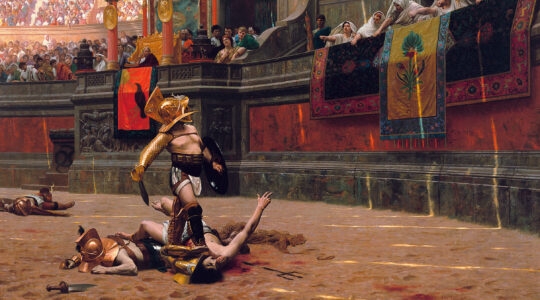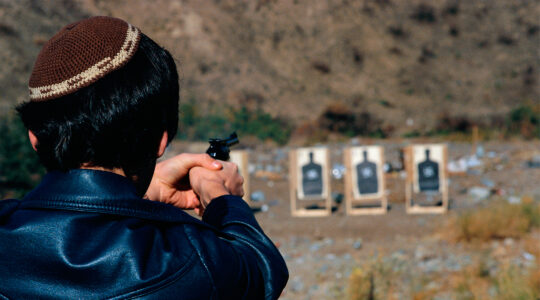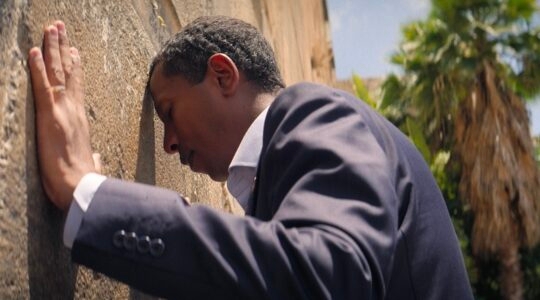Both the Zionist Organization of America and the Republican Jewish Coalition have joined the Anti-Defamation League in criticizing the choice of Mary Robinson for the Presidential Medal of Freedom.
"Awarding the Medal of Freedom to Mary Robinson does great dishonor to the many outstanding men and women who have received it in the past," said RJC executive director Matt Brooks.
The ZOA rips the award to Bishop Desmond Tutu as well, saying both he and Robinson are "virulent critics" of Israel.
“We are aware that, while other Jewish organizations have criticized the award to Mary Robinson, none appear to have taken issue with the same award being made to Desmond Tutu," said ZOA president Morton Klein. "It would appear that there is reluctance to criticize an African figure who had some prominence in the fight against apartheid in South Africa. Yet participation in a just cause does not, and should not, provide immunity from criticism for other words and deeds defaming Zionism and Israel while aiding the eliminationist Palestinian cause."
The full statements from the RJC and the ZOA are after the jump:[[READMORE]]
RJC: Mary Robinson is not an appropriate recipient for the Presidential Medal of Freedom
Washington, D.C. (August 4, 2009) — The Republican Jewish Coalition (RJC) today spoke out strongly against President Obama’s decision to award Mary Robinson the Presidential Medal of Freedom. The President will honor 16 people with the Medal of Freedom on August 12.
RJC Executive Director Matt Brooks said, "Mary Robinson, who was one of the people responsible for the 2001 Durban conference against racism descending into an anti-Israel propaganda forum, is not an appropriate recipient for one of our nation’s highest honors. In fact, awarding the Medal of Freedom to Mary Robinson does great dishonor to the many outstanding men and women who have received it in the past."
RJC responded to the late Friday afternoon statement by the White House spokesman Tommy Vietor, who said, "Mary Robinson has dedicated her career to human rights… As with any public figure, we don’t necessarily agree with every statement she has ever made, but it’s clear that she has been an agent of change and a fighter for good."Yet the late Rep. Tom Lantos (D-CA), a member of the U.S. delegation to the Durban conference (later withdrawn when the U.S. boycotted the event), described Mary Robinson this way: "To many of us present at the events at Durban, it is clear that much of the responsibility for the debacle rests on the shoulders of UN High Commissioner for Human Rights Mary Robinson, who, in her role as secretary-general of the conference, failed to provide the leadership needed to keep the conference on track."
Brooks said, "We’re troubled that the White House chooses to minimize the very real controversy about Mary Robinson. It’s wrong for the United States to honor someone who led a meeting that our nation boycotted. She had the opportunity to fight for good – by resisting the effort to turn the Durban conference into a swamp of anti-Semitic and anti-Israel propaganda. She not only failed to resist it, she facilitated it. That President Obama wishes to honor Mary Robinson in this way is profoundly disturbing."
Among the past recipients of the Medal of Freedom are people who personify some of America’s greatest ideals. They include men and women who have fought for freedom, such as Aung San Suu Kyi, Natan Sharansky, Rosa Parks, and Jeane Kirkpatrick; advocates of human rights such as Elie Wiesel, Mother Teresa, and Simon Wiesenthal; and foreign leaders whose courage and leadership have contributed to world peace and security, such as John Howard, Tony Blair, Vaclav Havel, and Margaret Thatcher.
Brooks continued, "The choice of Mary Robinson for this award calls into serious question the White House vetting process, given Robinson’s well-known record, particularly with regard to the 2001 Durban conference. The U.S. boycotted the conference and it was the subject of intense public discussion. If the White House staff passed on Robinson’s name knowing how controversial and troubling the choice would be, that’s wrong in and of itself. If Robinson’s name made it onto the Medal of Freedom list because the White House staff was unaware of how controversial she was, that’s even worse."Background:
* Mary Robinson served as UN High Commissioner for Human Rights and was secretary-general of the 2001 World Conference against Racism, Racial Discrimination, Xenophobia and Related Intolerance in Durban, South Africa.
* The late Rep. Tom Lantos (D-CA) wrote an extensive article, an insider’s view of the "Durban debacle," which appeared in the Winter/Spring 2002 issue of the Fletcher Forum of World Affairs, published by the Fletcher School of international affairs at Tufts University. He wrote of Mary Robinson:To many of us present at the events at Durban, it is clear that much of the responsibility for the debacle rests on the shoulders of UN High Commissioner for Human Rights Mary Robinson, who, in her role as secretary-general of the conference, failed to provide the leadership needed to keep the conference on track.
Lantos describes how Robinson allowed the Asian Preparatory meeting for the WCAR to take place in Tehran. Israeli passport holders and Israeli NGOs were initially barred from the meeting, despite requests from the Simon Wiesenthal Center that the meeting be moved:
She rejected the request, however, maintaining that throughout the fall and winter that the Iranian government understood that all NGOs must be allowed to attend. Although Robinson did successfully negotiate to obtain the visas on the first day of the conference, Jewish NGOs were effectively excluded from participation, as there was no way to arrange transportation to Tehran until the closing of the meeting.
…At the end of the Tehran Meeting, Commissioner Robinson made no visible effort to confront the breakdown that had occurred in the global dialogue on race that she had done so much to nurture. In fact, in a baffling statement to the press after the conclusion of the conference, she congratulated the Tehran delegates on their degree of "consensus" and urged them to carry on in the fight against racism. She characterized the meeting as a productive dialogue between civilizations. When asked about the inflammatory rhetoric directed at Israel, she stated, "The situation in the Palestinian occupied territories was brought up at the meeting and it is reflected in the final declaration." These comments represented a pivotal moment in the evolution of the WCAR. By appearing to condone the Asian conference’s efforts to place the Israeli-Palestinian conflict on the agenda of the World Conference, she betrayed its intentions and emboldened those intent on using the conference for their own political purposes. From that moment the conference began to take a dangerous trajectory that became ever more difficult to correct.As a member of the U.S. delegation, Lantos participated in efforts to keep the Durban conference focused on human rights around the world, rather than on the Israel-Palestinian conflict. He described Robinson as undermining those efforts:
Secretary Powell’s plan to save the conference was elegant and powerful in its simplicity: make clear that U.S. participation at Durban would depend upon removal of the text attacking Israel, and mount an intensive diplomatic offensive to isolate the hardline OICs states as the obstacle to success.
… Mrs. Robinson’s intervention with the assembled delegates later in the same day left our delegation deeply shocked and saddened. In her remarks, she advocated precisely the opposite course to the one Secretary Powell and I had urged her to take. Namely, she refused to reject the twisted notion that the wrong done to the Jews in the Holocaust was equivalent to the pain suffered by the Palestinians in the Middle East. Instead, she discussed "the historical wounds of anti-Semitism and of the Holocaust on the one hand, and…the accumulated wounds of displacement and military occupation on the other."
Thus, instead of condemning the attempt to usurp the conference, she legitimized it. Instead of insisting that it was inappropriate to discuss a specific political conflict in the context of a World Conference on Racism, she spoke of the "need to resolve protracted conflict and occupation, claims of inequality, violence and terrorism, and a deteriorating situation on the ground." Robinson was prepared to delve into the arcana of a single territorial conflict at the exclusion of all others and at the expense of the conference’s greater goals.
Robinson’s intervention broke all momentum that the U.S. had developed.
…It was clear to me that Mrs. Robinson’s intervention during the Geneva talks represented the coup d’grace on efforts to save the conference from disaster. If the conference was knocked off track in Tehran, it was completely derailed in Geneva.
…As the U.S. pressed its case, Robinson seemed to be working to stymie our efforts. In her public and private statements, as was the case in Geneva, she insisted that the conference had to recognize the suffering of the Palestinian people.http://fletcher.tufts.edu/forum/archives/pdfs/26-1pdfs/Lantos9.pdf
In the end, Secretary of State Colin Powell announced that the U.S. would withdraw from the Durban conference, noting:I know that you do not combat racism by conferences that produce declarations containing hateful language, some of which is a throwback to the days of ‘Zionism equals racism’; or supports the idea that we have made too much of the Holocaust; or suggests that apartheid exists in Israel; or that singles out only one country in the world, Israel, for censure and abuse.
http://www.fas.org/sgp/crs/row/RL34754.pdf, page 12, footnote 37.
* Michael Rubin, writing in National Review in 2002, notes that Robinson’s record after the Durban conference is equally troubling:On April 15, Robinson’s commission voted on a decision that condoned suicide bombings as a legitimate means to establish Palestinian statehood (six European Union members voted in favor including, not surprisingly, France and Belgium). The vote came after Robinson initiated a drive to become a fact finder to investigate the now-famous massacre in Jenin (also known as "the massacre that never happened"). Curiously, in the months preceding Israel ‘s incursion into the U.N. refugee camp in Jenin, suicide bombers launched from the camp wearing explosives likely bought with European money killed more than 100 Israeli civilians. However, for Robinson, a massacre is the deaths of seven Palestinian civilians in a war zone (47 Palestinian militants and 23 Israel soldiers also died). The deaths of more than 100 Jewish civilians by suicide bombers is worthy of little more than deafening silence interrupted by an occasional pithy statement of moral equivalence.
http://www.nationalreview.com/comment/comment-rubin052002.asp
* When Robinson was appointed to the faculty of Columbia University in 2004, the head of the Conference of Presidents of Major Jewish Organization, James Tisch, expressed concern:Under Mary Robinson’s leadership the Human Rights Commission was one-sided and extremist. In her tenure at the HRC, she lacked fairness in her approach to the Israeli/Palestinian issue… I am hopeful – for the sake of her students and the reputation of Columbia – that as she enters the world of academia she will demonstrate more balance in her views.
http://www.frontpagemag.com/readArticle.aspx?ARTID=14336
And the ZOA:
The Zionist Organization (ZOA) has criticized President Barack Obama for awarding America’s highest civilian honor, the Medal of Freedom, to two virulent critics of Israel, former Irish President and former United Nations High Commissioner for Human Rights Mary Robinson and former South African Archbishop Desmond Tutu. Both have made statements and presided over organizations and conferences that were viciously critical of Israel.
Mary Robinson’s record on Israel:
Robinson was the driving force behind the ‘World Conference against Racism, Racial Discrimination, Xenophobia and Related Intolerance’ (the Durban I Conference) in September 2001 that was in fact an anti-Semitic hate carnival. “She said nothing when the preliminary Asian Regional Conference in Tehran (from which Israel was excluded) inserted blatantly racist statements into the conference agenda. She failed to speak out when, on the grounds of the U.N. conference itself, the Arab Lawyers Union distributed pamphlets depicting hook-nosed Jews as Nazis spearing Palestinian children. In the same tent where nongovernmental organizations depicted Israel as a "racist, apartheid state," were distributed fliers entitled, "What if Hitler had won?" The answer: "There would be no Israel, and no Palestinian bloodshed.” Nor did she protest when the South African hosts denied visas to European anti-slavery activists critical of human rights in Sudan and other Muslim states (Michael Rubin, ‘Mary Robinson: War Criminal?’ National Review Online, May 20, 2002).
In April 2002, Robinson’s Human Rights Commission voted on a decision that condoned suicide bombings as a legitimate means to establish Palestinian statehood after Robinson initiated a drive to become a fact finder to investigate the now-famous fictitious massacre in Jenin.
In June 1999, when the Geneva Conference of High Contracting Parties to the Fourth Geneva Convention, a body that had never been convened in its history gathered to condemn the Israeli construction of apartment blocks on empty, Jewish-owned land in eastern Jerusalem, Robinson insisted that the Fourth Geneva convention applies to the “Occupied Palestinian Territories” and that “legal and diplomatic mechanisms under the United Nations Charter” and the Convention “remain an option for serious consideration” against Israel. These options include trials for war crimes and crimes against humanity. So extreme were Robinson’s words at this conference (which was curtailed when its Convener, Switzerland’s Walter Gyger, counseled restraint and adherence to non-politicized terms of reference) that she was censured for them.
During the so-called Naqba riots in May 1998, when Jews were assaulted at prayer by rioting Palestinians, Robinson spoke only of the rioters who were killed and injured by Israeli police as victims and called upon Israel to “respect the right of peaceful assembly, to avoid the excessive use of force.”
In November 2000, when she visited Israel and the Palestinian Authority (PA)-controlled areas, Robinson said she came to “hear” the Palestinians but to “put points to [the Israelis],” indicating she was taking the Palestinian side even before arrival. She subsequently surrendered to PA demands that she cancel meetings with Israel’s democratically-elected opposition figures. Acting Israeli Foreign Minister Shlomo Ben-Ami (Labor) saw this as so blatantly biased that he declined to meet with her. Her subsequent report on her visit consisted largely of regurgitating Palestinian claims, no matter how subjective, including anger at those who had dared to (correctly) allege that Palestinian children were deliberately dispatched to scenes of violence. The stoning of Jewish worshippers at Jerusalem’s Western Wall and the destruction of Joseph’s Tomb and a Jericho Synagogue received barely a reference, but after meeting with Muslim and Christian clerics, she called on Israel to respect and protect religious sites.
In 2000, when the Iranian government arrested and convicted a number of Jews on trumped-up charges of espionage for Israel in an in camera trial, utilizing forced confessions as evidence, Robinson accepted the Iranian position that it was an internal Iranian matter and did not send observers to the appeal trial.
In 2000, Robinson appointed Mona Rishmawi to a senior position within her Commissariat. Rishmawi has likened Israeli practices in the territories to those of Nazis and is a long time activist of al-Haq, the Palestinian advocacy organization promoting a Palestinian agenda couched in terms of human rights.
As UN High Commissioner for Human Rights (1997-2002), Robinson took a discriminatory line against Israel as soon as she took that post. She discontinued the practice of her predecessor, Ecuador’s José Ayala-Lasso, of meeting with both the UN regional groups and the Israeli ambassador to discuss human rights matters. (As the only member-state not a member of any regional group, Israelis could only obtain information from the HCHR on this basis). Only later did she reluctantly resume the practice of inviting the Israeli ambassador.
During the last four years of Robinson’s term as Irish president and at a time that Ireland held the EU presidency (second half of 1996), EU aid money to Yasser Arafat went to terrorism. PA documents seized by Israel in 2002 from Arafat’s Muqata compound in Ramallah show that the PA spent approximately $9 million of EU aid monthly on the salaries of those organizing terror attacks against civilians. “While European officials like Robinson looked the other way, the Palestinian Authority regularly converted millions of dollars of aid money into shekels at rates about 20 percent below normal, allowing the Palestinian chairman to divert millions of dollars worth of aid into his personal slush fund … European funds enabled Arafat to purchase $50 million worth of sophisticated Iranian weaponry for use against civilians” (Michael Rubin, ‘Mary Robinson: War Criminal?’ National Review Online, May 20, 2002).
Desmond Tutu’s record on Israel:
Smears Zionism as being racist: Tutu has claimed that Zionism has “very many parallels with racism.” (American Jewish Year Book, 1988, p.50).
Calls Jews arrogant: Tutu accused Jews of exhibiting “an arrogance–the arrogance of power because Jews are a powerful lobby in this land and all kinds of people woo their support,”(Jewish Telegraphic Agency Daily News Bulletin, Nov. 29, 1984).
In a speech delivered to a two-day conference titled, ‘The Apartheid Paradigm in Palestine-Israel,’ Tutu was reported to have cited passages from the Bible to argue that the God worshiped by Jews would champion the cause of Palestinians, “Remembering what happened to you in Egypt and much more recently in Germany — remember, and act appropriately … If you reject your calling, you may survive for a long time, but you will find it is all corrosive inside, and one day you will implode” (‘Tutu urges Jews to challenge oppression of Palestinians,’ Boston Globe, October 28, 2007).
Compares Israel to Hitler, Stalin and apartheid: “I have been very deeply distressed in all my visits to the Holy Land, how so much of what was taking place there reminded me so much of what used to happen to us Blacks in Apartheid South Africa … The Apartheid government was very powerful, but we said to them: Watch it! If you flout the laws of this universe, you’re going to bite the dust! (applause) Hitler was powerful. Mussolini was powerful. Stalin was powerful. Idi Amin was powerful. Pinochet was powerful. The Apartheid government were powerful. Milosevic was powerful. But, this is God’s world. A lie, injustice, oppression, those will never prevail in the world of this God. That is what we told our people. And we used to say: those ones, they have already lost, they are, they are going to bite the dust one day. We may not be around. An unjust Israeli government, however powerful, will fall in the world of this kind of God” (Tutu in an address delivered at Old South Church, Boston to the Friends of Sabeel North America’s conference, (a body whose leaders say that Israelis are “crucifying” Arabs like the Jews did Jesus), April 13, 2002). [ZOA: The full text of this address was once available on-line at http://media.startribune.com/smedia/2007/10/03/19/Archbishop_Tutu_Transcript.source.prod_affiliate.2.doc, but disappeared sometime after ZOA cited it at length in a press release of October 12, 2007].
Refuses to call Israel by name: In conversations during the 1980s with the Israeli ambassador to South Africa, Eliahu Lankin, Tutu “refused to call Israel by its name, he kept referring to it as Palestine.” (Simon Wiesenthal Center’s Response magazine, January 1990).
In November 2006, Tutu was appointed by the same UN Human Rights Commission previously headed by Mary Robinson to head its “investigative commission” to the northern Gaza Strip town of Beit Hanoun to investigate “human rights violations” by Israel” which Tutu had already condemned as “an outrage that cries out to heaven and we must condemn it unequivocally.” The commission never investigated Sudan, or other scenes of genuine, massive human rights abuses.
Falsely claims Jews create refugees: Asked about the Zionism-is-racism resolution, Tutu complained that “the Jewish people with their traditions, religion and long history of persecution sometimes appear to have caused a refugee problem among others.” (South African Zionist Record, July 26, 1985).
Urged Jews to forgive Nazis: During his 1989 visit to Israel, Tutu “urged Israelis to forgive the Nazis for the Holocaust” (Jerusalem Post, December 31, 1989), a statement which the Simon Wiesenthal Center called “a gratuitous insult to Jews and victims of Nazism everywhere” (Simon Wiesenthal Center’s Response magazine, January 1990).
Claims Jews monopolize victimhood: Jewish Monopoly of the Holocaust: Tutu complained about “the Jewish monopoly of the Holocaust.” (Jerusalem Post, July 26, 1985).
Depicts the Jewish lobby as malignly powerful: “People are scared in this country [the U.S.], to say wrong is wrong because the Jewish lobby is powerful–very powerful.”
Claims critics of Israel are smeared: “You know as well as I do that, somehow, the Israeli government is placed on a pedestal [in the U.S.] and to criticize it is to be immediately dubbed anti-Semitic, as if Palestinians were not Semitic.”
During the 1989 visit to Israel, Tutu remarked “If I’m accused of being anti-Semitic, tough luck,” and in response to questions about his anti-Jewish bias, Tutu replied, “My dentist’s name is Dr. Cohen.” (Simon Wiesenthal Center’s Response magazine, January 1990)
Claims Judaism tries to monopolize G-d: Speaking in a Connecticut church in 1984, Tutu said that “the Jews thought they had a monopoly on God; Jesus was angry that they could shut out other human beings.” In the same speech, he compared the features of the ancient Holy Temple in Jerusalem to the features of the apartheid system in South Africa. (Hartford Courant, October 29, 1984).
ZOA National President Morton A. Klein said, “It is deplorable that President Obama should have honored two such utterly partisan, vociferously anti-Israel figures like Mary Robinson and Desmond Tutu.
“Mary Robinson and Desmond Tutu’s records of defaming Israel, as we have shown above, stand for themselves. Both figures have shown a propensity to pervert and disserve the cause of human rights in the course of heading committees and organizations designed to defend them. That tells us something about the state of human rights organizations and their internal perversion by anti-Israel activists and the repressive and corrupt regimes which tend to control these bodies. But it also tells us something about Robinson and Tutu. Neither Robinson nor Tutu ever resigned in protest at the direction these bodies have taken, or took anything that could be called a courageous stand in favor of truth. Rather, both have lent their reputations to travesties of the truth and given the bodies on which they served an aura of undeserved legitimacy. By awarding them the Medal of Freedom, President Obama compounds their offense by lending them further underserved legitimacy.
“We are aware that, while other Jewish organizations have criticized the award to Mary Robinson, none appear to have taken issue with the same award being made to Desmond Tutu. It would appear that there is reluctance to criticize an African figure who had some prominence in the fight against apartheid in South Africa. Yet participation in a just cause does not, and should not, provide immunity from criticism for other words and deeds defaming Zionism and Israel while aiding the eliminationist Palestinian cause.
“We also note that President Obama recently meet with Jewish leaders to reassure them about his policies to Israel, something words alone cannot do when so much else in the words and deeds of the Obama Administration gives genuine cause for concern. At a time when President Obama is being severely criticized by Jewish leaders for bias against Israel and in favor of Arabs, and has only 6% of Israelis call him pro-Israel, one would have expected him to be especially careful not to offend pro-Israel sensibilities by honoring two of Israel’s most severe critics. How little President Obama seems to regard Jewish sensitivities can be seen by these awards to Robinson and Tutu only weeks after that meeting."

Help ensure Jewish news remains accessible to all. Your donation to the Jewish Telegraphic Agency powers the trusted journalism that has connected Jewish communities worldwide for more than 100 years. With your help, JTA can continue to deliver vital news and insights. Donate today.





